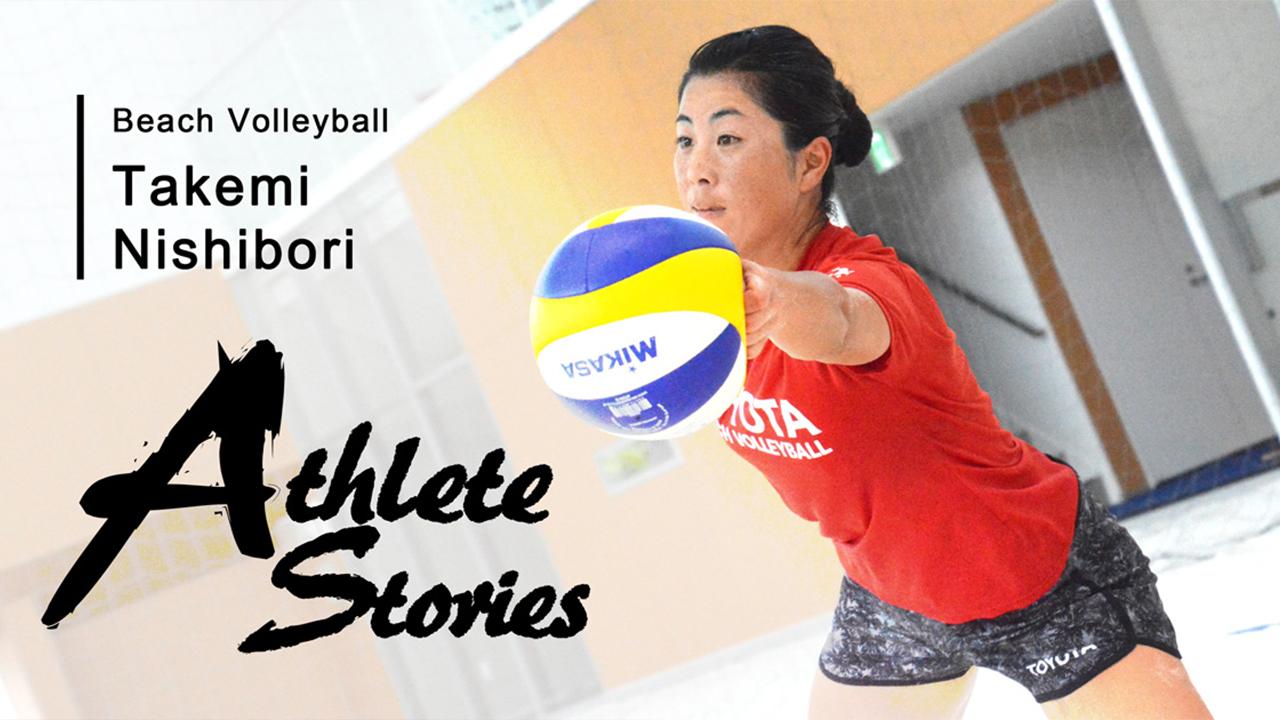
Takemi Nishibori, age 37, works by day in the Kinuura Plant Quality Control Division at Toyota Motor Corporation. This is her story.

※The article has been published in Toyota Global Newsroom on September 10, 2018.
Among the sports teams managed within Toyota, the beach volleyball team is one of the newest, established in 2015. Recently, in July, the team was in the news for relocating its training base from Hiratsuka, Kanagawa Prefecture to a newly completed indoor beach volleyball facility within the grounds of Toyota’s Kinuura Plant in Hekinan, Aichi Prefecture.
The beach volleyball team boasts an experienced roster of athletes. Among them are Katsuhiro Shiratori, who represented Japan in men’s beach volleyball at back-to-back Olympics and went on to coach the Japanese national women’s team, and Yusuke “GOTTSU” Ishijima, who played in Japan’s V-Premier League and was on the Japanese men’s volleyball squad at the 2008 Beijing Olympics.
Takemi Nishibori is also on the team. Nishibori, a 15-year women’s beach volleyball veteran, is known for having increased the popularity of the sport in Japan, along with her former beach volleyball partner Miwa Asao. Although Asao has since retired to pursue her career as a television personality, Nishibori has continued to be a driving force for beach volleyball. We caught-up with Takemi at one of her many practice sessions at Kinuura on July 18.
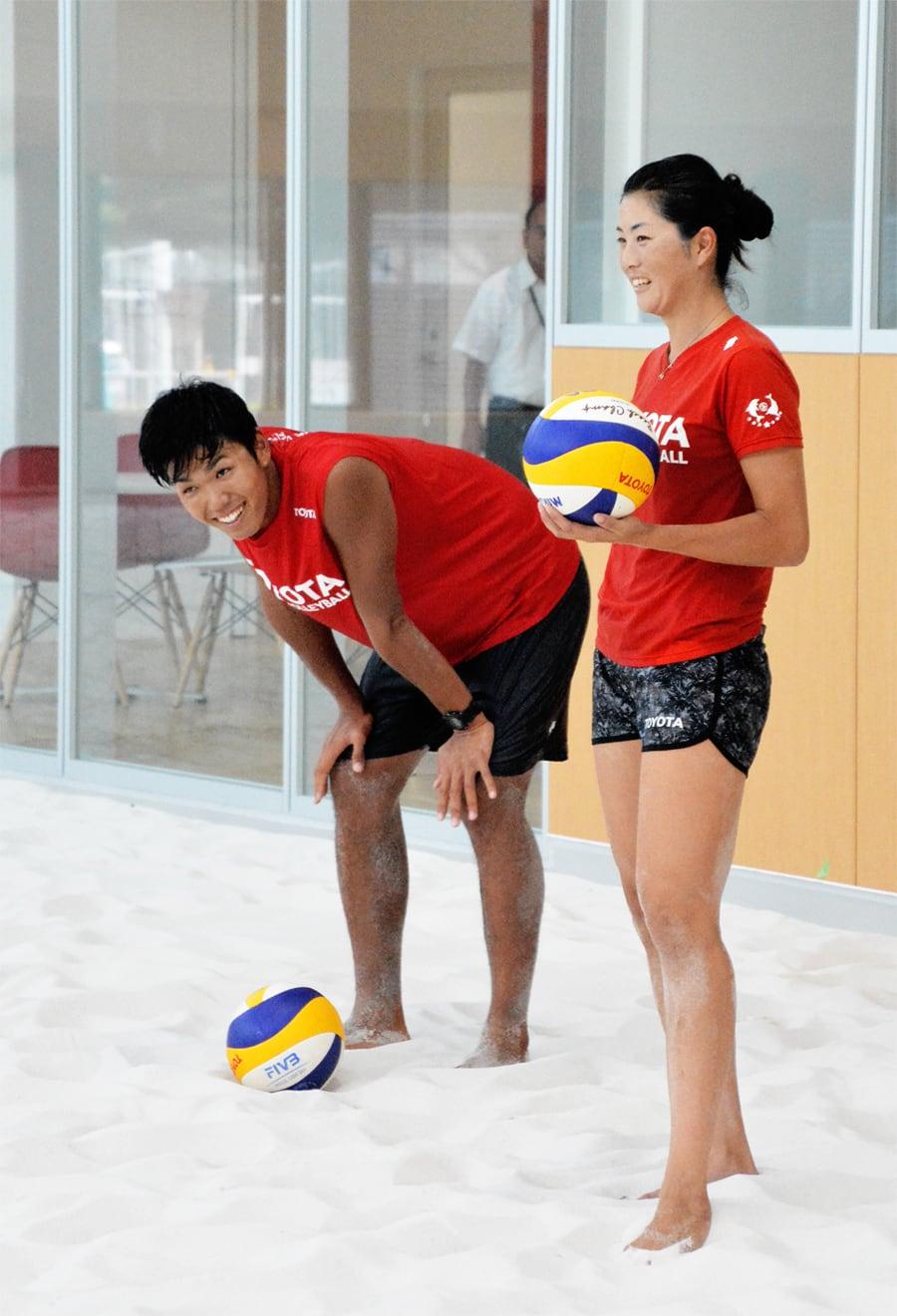
The biggest challenge in competition life
Nishibori and her twin sister began playing volleyball at the age of three under the influence of their mother, a former athlete that competed in organized volleyball. Takemi decided on the position of spiker, while her twin Ikumi became a setter. The regional club team they belonged to was a powerhouse strong enough to aim for the Japan national title.
“It was unbearable when we lost after making it to the country’s elite eight bracket in my final tournament as a sixth-year elementary school student. My teammates and I went on to a private junior high school also known to have a powerful team,“ said Nishibori.
Their team made up for the earlier loss by winning the national title in their third year of junior high. In high school, Takemi and Ikumi received a recommendation to attend Furukawa Industrial High School in Miyagi Prefecture, so they left their native Nagano Prefecture. In their third year, they won the spring inter-high school national championship, capping out what was known as the “high school triple crown,” or the big three tournaments for high school athletes. The wins earned them national attention as the “Nishibori Twins”.
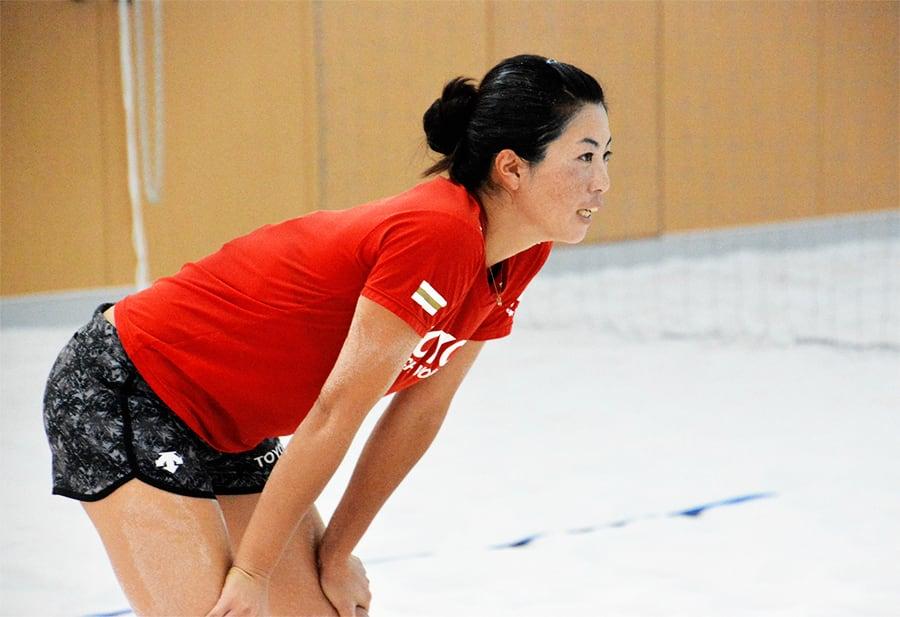
“ I was unaware of it until I graduated, but the school had apparently said that I was a little short to be a spiker, and that I might not make it as a regular for all three years. But with the support from our former junior high school teacher, telling the school that ‘the two need to play together to bring out their strengths,’ my sister and I were able to play on the team.”
After high school, the sisters joined JT Marvelous, a first-division V.Premier League adult team, but their play time gradually decreased.
“Things stopped being fun, and I wondered for the first time if maybe it was time to call it quits. Until then, because I had been on the court, I didn’t know what I needed to do to get a chance to play. So I’d blame it on the coach and such. But, looking back, I think there were a lot of things that I could have done.”
However, Takemi says that she has no regrets. Quitting volleyball and going to university to earn a certification as a sports trainer had already been on her mind. Both she and her sister ended up leaving their volleyball team in 2003, and instead the pair took up a third option – beach volleyball.
“It all started when one JT Marvelous coach who knew a lot about beach volleyball said, ‘If both of you are quitting volleyball, why don’t you give it a try?’ At first, we weren’t thinking to make a serious thing out of it, and we started [beach volleyball] just hoping that the both of us could have some fun.”
Here now because of the support of many
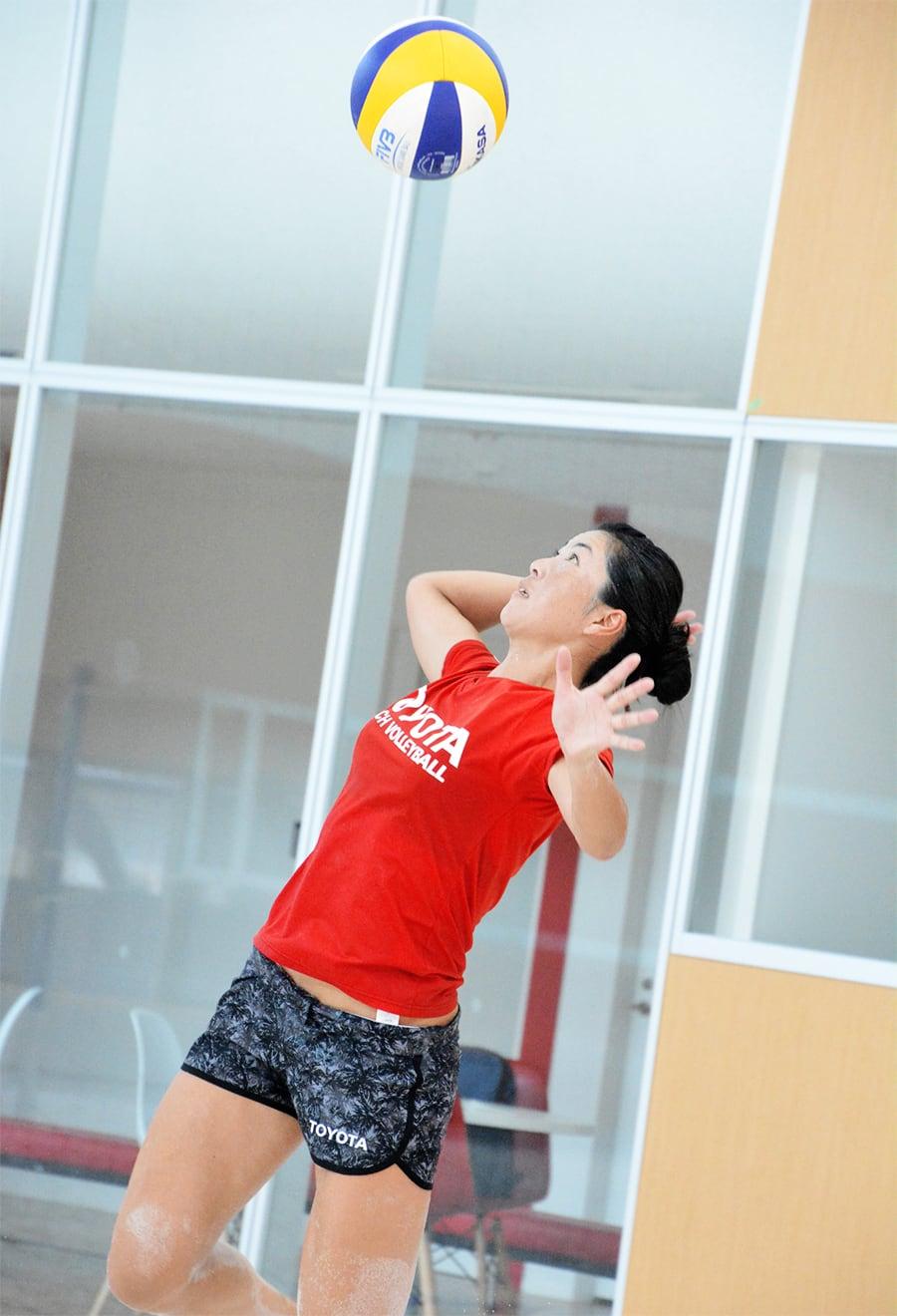
When Nishibori first started playing beach volleyball, she supported herself through part-time jobs. Although she had not intended to get serious about her new sport, something kept her going.
“As it turned out, at the root of it all I found I really liked volleyball. Even though beach volleyball is, in essence, volleyball, it’s difficult, the wind blows, and the sand varies. I was so happy when I reached the point I was able to compete in different circumstances, and it was a lot of fun just to win one match”, she said.
We were allowed onto the court (onto the sand) for the interview and quickly realized that even just to walk, without much experience, the best one could do was totter or waddle along.
Beach volleyball is played by chasing the ball over sand, fully exposed to the searing sun and ocean breezes. Unlike conventional volleyball, which is played with teams of six, beach volleyball involves a pair of players (two) per team. As she experienced again the true sense of self-growth amid the particular difficulties of beach volleyball, Nishibori was reminded of why she had taken up the sport in the first place. Her desire to win slowly began to grow.
However, finding sponsors was no easy task, in contrast to the current excitement that exists now thanks to the Tokyo Olympics being just two years away, and companies actively moving to cultivate and sponsor athletes. Despite being a well-known beach volleyball star written about and covered in the press, up until just four years ago, Nishibori found herself having to go out and find her own sponsors, sometimes even traveling abroad to find them.
“I would get an appointment, have materials on hand that explained the rules and my accomplishments, and go around asking companies to sponsor me. It was hard, but I did get a sense that there were people who were behind me,” she said.
Nishibori, as a long supporter of beach volleyball, has, herself, been supported by many people. While interviewing her, she clearly expressed her feelings of appreciation for her teachers, teammates, sponsors, and all the people who have been involved so far.
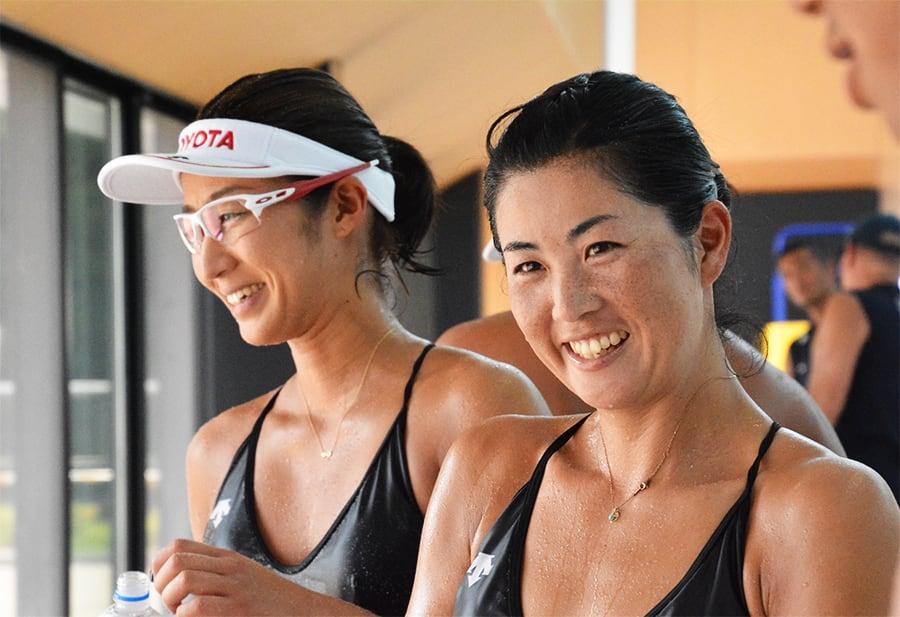
Sayaka Mizoe, Nishibori’s teammate for four years, shared her thoughts: “Nishibori worked hard to make us into a good team, and, with me being the younger, looked after things for me other than just how we played. Feelings of appreciation toward and caring about our competitors were important to her, so much so that she would get angry with me if I did not appear to show it.”
While the media mostly showed the positive side of things, unknown to many were the hardships that Nishibori endured. Cherishing bonds between people and always having a heart full of appreciation are characteristics that have contributed to her being the person she is today.
To compete with the world
In 2005, Nishibori decided to stop pairing with her twin sister and teamed up with Asao. The desire to win had been welling up inside her, and she was unsure of how two inexperienced players could find a way forward.
“Back in my volleyball days, the coach would come up with a strategy, and we would execute it as instructed. But, after switching to beach volleyball, there was no coach, so we thought up our own strategy and had to revise it if it didn’t work. Even if there is a coach, rules prohibit the coach from giving instructions during a match,” explained Nishibori.
After training under a beach volleyball coach for the first time and finally being able to begin in earnest, Nishibori suddenly found herself finishing in third-place on a national tour, even though she had previously been unable to even make it through the preliminary rounds.
Speaking on the results earned with Asao, she said, “Although we hadn’t been together as a pair for long, we still managed to get results, which made me want to keep going at it a little bit longer. What was intended to last for just one tournament turned out to be a lengthy pair relationship.”
Next, Nishibori and Asao set their sights on the Olympics. However, they missed out on representing Japan in Beijing in 2008 because they failed to make the cutoff in the world rankings.
Head Coach Tomohisa Yamamoto, who also works at Kinuura, was coach of the Japan’s women’s team at the time and explained: “She [Nishibori] was good at volleyball. She didn’t have much of a career in beach volleyball, so I thought she needed more time to get used to it. If she could finally manage to move around on the sand, I felt she would be able to put her talent to use.”
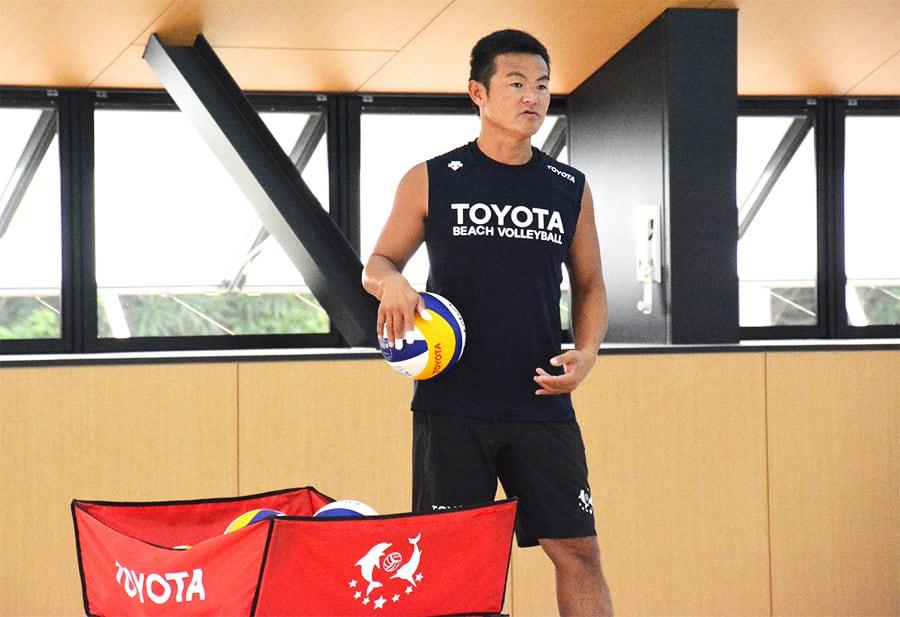
Nishibori went on to raise her level of skill as she competed both in Japan and overseas. Later, after pairing with a new partner, she was able to represent Japan in the Olympic-qualifying competition. Unfortunately, for both London in 2012 and Rio de Janeiro in 2016, defeat came in the final qualifying round, meaning that the Olympic-appearance streak for Japanese beach volleyball players, which had continued ever since beach volleyball became an official event in 1996 in Atlanta, had, for sure, come to an end.
“I was forced to think about what was lacking, and I felt immense responsibility for letting the chance [to have Japan represented in the Olympics] escape. It took me quite some time to recover. I definitely want to erase such anguish by earning the right to make it to the Tokyo Olympics and being able to encourage and promote beach volleyball further across Japan,” said Nishibori.
When competing with the best from the world, what do you need to win?
“The Japan team isn’t tall enough. Of course, no matter what we do, we can’t get any taller. But what we can do is continue to sharpen our skills. We need a level of precision in our passing and tossing that will allow us to execute accurately, even when the wind is blowing, regardless of the condition of the sand, and no matter how tall our competitors are,” said Nishibori.
Feeling inferior as a volleyball player due to her lack of height, Nishibori says that she has long strived to achieve execution precision that would be second to none.
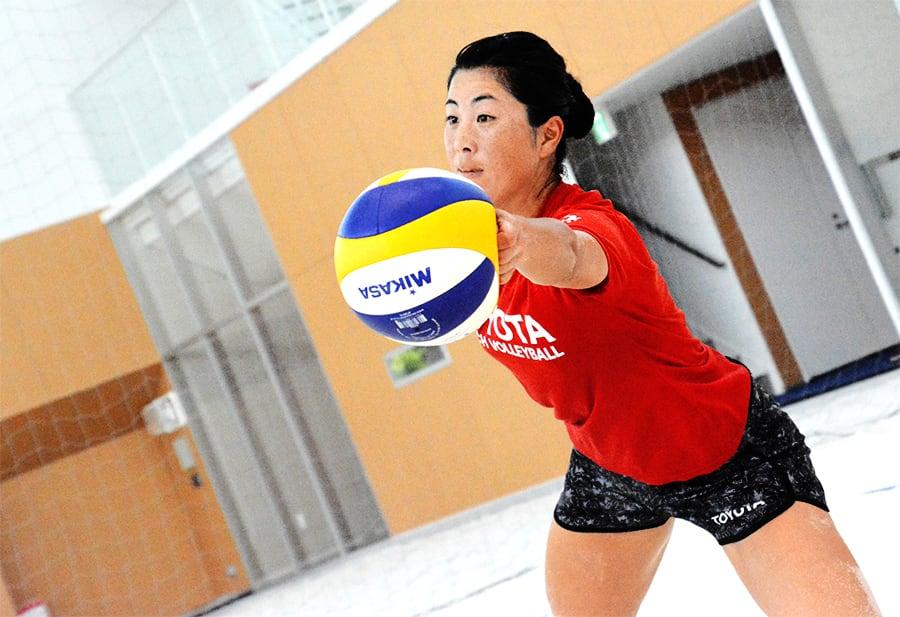
Nishibori’s strengths are her speed and agility developed from her volleyball days and her more recently acquired ability to adapt the way she plays depending on the weather and the condition of the sand—a skill that she has cultivated in her 15 years since switching to beach volleyball. Coach Yamamoto says that aside from the physical abilities, the real challenge is mental – by mastering those, Nishibori’s strengths will be brought out.
“Nishibori is, at the core, an emotional player. But, when she gets too emotional about wanting to win, hitting her mark, or scooping up the ball, she tends to prevent her body from moving smoothly. Fortunately, she realizes this. Since last year, her efforts have been focused more on trying to simply respond to the ball, without letting her emotions run too high, and she has made much progress,“ said Yamamoto.
Nishibori’s strengths are “second to none”, and based on our discussion, it is clear that she knows what has to be done to bring them out to their fullest. That is probably why she is able to continue playing an active role on the front line. (To learn more about Nishibori’s achievements, please be sure to check out her attached profile.)
Profile
Date of birth: August 20, 1981
Blood type: A
Place of birth: Nakano, Nagano Prefecture
High school: Furukawa Industrial High School (currently Furukawa Gakuen Senior High School)
Nickname: “Take” (pronounced Tah-kay)
Family: Father, mother, younger twin sister
Competitions
Results
As an adult (beach volleyball)
2015 World Tour Open (South Africa)—Second Place
2017 Japan Beach Volleyball Tour, Year Champion/2nd & 3rd Match—First Place
2017 28th All-Japan Women’s Beach Volleyball Championships—First Place
2018 Asia Tour Country Tournament—Third Place
2018 29th All-Japan Women’s Beach Volleyball Championships—First Place
National team membership
2012 Member of Japanese squad in Asian qualifying matches for London Olympics
2016 Member of Japanese squad in Asian qualifying matches for Rio de Janeiro
Olympics
Personal
Personality in brief: “My pace” (Others on the team says she likes to live fast.)
Hobby: Collecting cat magazines
Special skill: Finding stray cats
Childhood dream: To become a nurse
Current dream for the future: To run a cat café
Favorite foods: Curry and Korean barbecue
Least-liked foods: Sashimi and similar raw foods
Favorite artist: Superfly
Favorite animal: Cat

